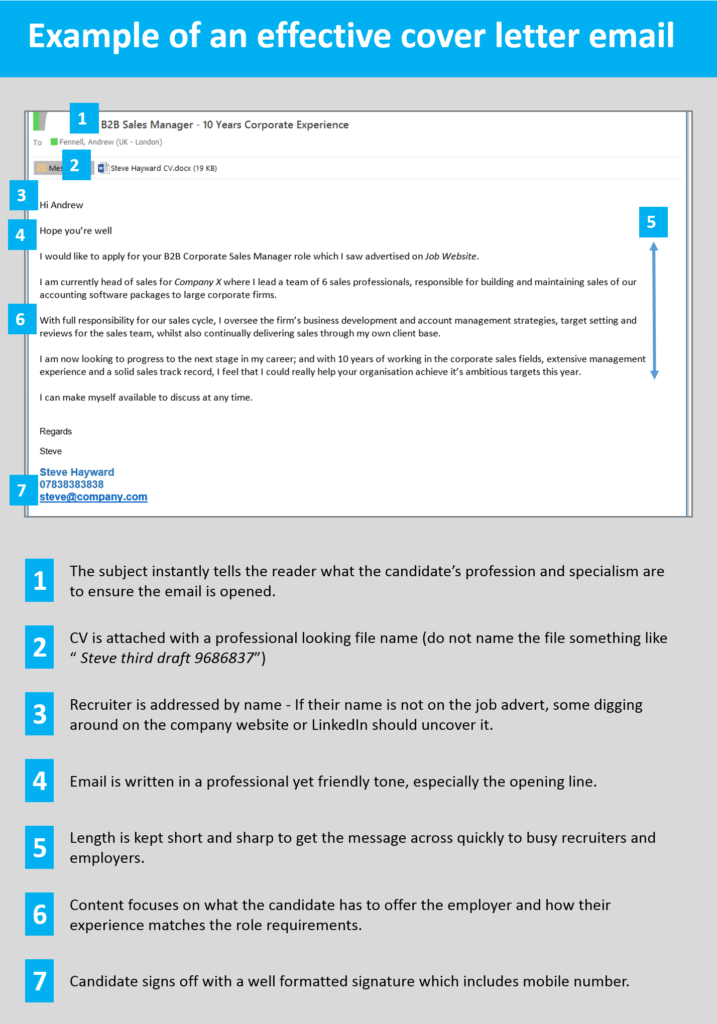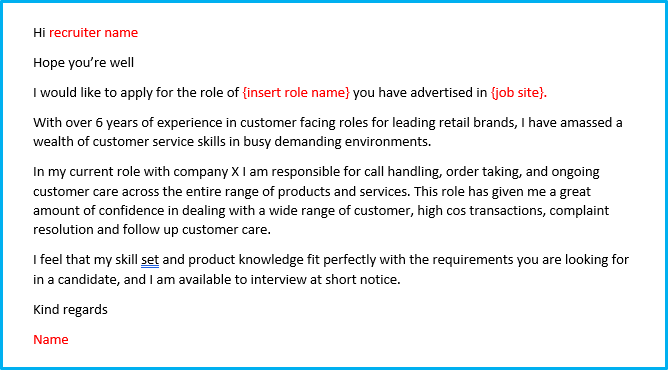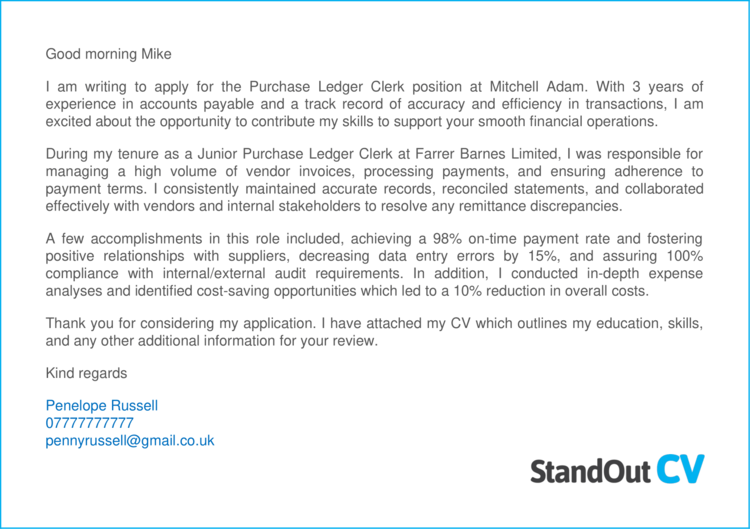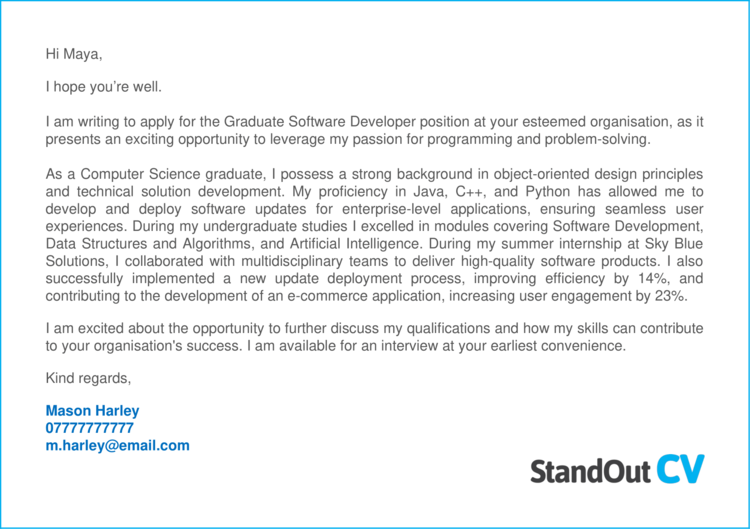Even before a hiring manager reads your CV, they review your cover letter to get a sneak peek into who you are and if you’re a good fit for the job.
But how long should it be?
In this article, you’ll learn how long your cover letter should be, what to include, plus three examples that’ll have recruiters excited to read your CV and learn more about you.
How long should a cover letter be?
Your cover letter needs to be around 3 – 6 sentences long and allow a person to read it fully in under 30 seconds.
Why? Well, there are very short attention spans in the world of recruitment.
Hiring managers receive an average of 500 applications for every job being advertised, so they don’t have much time to read each one.
For this, reason your cover letter needs to be brief and get to the point quickly.
Essentially, you must write enough to persuade them to open your CV, but not so much that it can’t be read in a few seconds.
Example of the perfect cover letter length



Where to write your cover letter
In terms of writing your cover letter, here’s the golden rule: Always write it straight into the body of your email or message.
But why?
Well, you want to make the right initial impression on a recruiter or hiring manager, don’t you? If your cover letter is directly there in an email, it’s immediately visible to employers and recruiters as soon as they open your application.
They don’t have to click on attachments or wait ages for documents to load. This saves them time and ensures they don’t neglect your application.
So don’t forget to incorporate your cover letter in the body of your application message like this:

If you’re emailing it, always use an attention-grabbing subject line that relates your skills to the position you’re interested in.
For example, use something along the lines of “Developer with 7 Years of Web App Experience.”
You need to make that immediate connection with the person handling the application.
Should you always write a cover letter?
Whenever you apply for a job, it’s essential to include a cover letter alongside your CV.
“But, why?” we hear you cry.
Because, without a cover letter, recruiters might not even open your CV.
You can think of it as your personal sales pitch that gets your foot in the door of an organisation.
What’s more, it says you care enough about the position to put in that extra effort.
It builds a rapport and encourages recruiters and hiring managers to open your CV.
So, don’t skip it – a well-written cover letter can open doors and make a true difference in your job search.
What to include in a cover letter
Your cover letter must entice hiring managers and recruiters.
Here’s what you must include in your cover letter.
Address the hiring manager or recruiter
Kick off your cover letter by addressing the hiring manager or recruiter of the job – this helps develop a relationship right from the get-go.
But don’t sound too formal or official.
Try something like, “Hi,”, “Hi [Insert recruiter’s name], or “Hi, [Insert department/team name.”
If you don’t know their name, check the company’s website or their LinkedIn profiles – this shows you’ve done your research.
Don’t panic if you have no luck finding their name. Just start your cover letter with “Hi” – this is perfectly okay in this situation.
Include a warm greeting
When writing your cover letter, insert a friendly greeting. This shows you can communicate well and provides a personal touch.
However, avoid sounding excessively informal or super stiff. Get the balance just right and use a friendly yet professional tone.
For example, begin with a simple, “I hope you’re well.”
Specify the position you’re applying for
Now you’ve warmed up with an amicable opening, get straight to it.
Tell the recruiter or hiring manager precisely which position you’re applying for.
Several recruiters and hiring managers handle multiple vacancies, so it’s imperative to be as clear as you can.



Show your suitability for the position
The meaty part of your cover letter tells them why you’re the best candidate for the role. This is what gets the recruiter’s attention and has them delving into your CV.
Peruse the job descriptions you’re applying to and look for the most important skills and qualifications the recruiter is asking for.
Then, when you write your cover letter, make your applicable skills the main focus.
Let them know why you’re the best fit for the position and how your skills are directly relevant to the job.
When you do this, recruiters will feel more confident that you’re the right applicant for the role.
Here are some examples:
- Marketing – “My expertise in digital marketing has resulted in a 30% boost in online conversions for my previous company.”
- Manufacturing – “My work as a Production Manager at Scott’s Manufacturing saw a 33% reduction in production costs and a 40% increase in output.”
- Finance – “I achieved an average annual return of 15% on a diverse portfolio of investments. My strategic planning optimised financial resources and cut operational costs by 30%.”
Conclude and discuss availability
To finish off, go for a warm closing such as “Kind regards” or “Regards.” Then provide a professional signature with your essential contact details.
This offers recruiters a variety of methods to get in contact with you. What’s more, it looks incredibly professional and shows you understand how to communicate in the workplace.
In your professional signature, you’ll need to include:
- Your full name – Your first name and surname.
- Your phone number – State the phone number you use most, such as your mobile.
- Your professional email address – Include a professional email address like dave-robins@gmail.com. But don’t mention unprofessional ones like hotstuff21@email.com – this doesn’t make you look very professional.
Optionally, feel free to mention:
- Your professional title – For example, Finance Manager or Content Writer.
- Your professional profile – Mention your professional social network, such as LinkedIn.
Here’s an example of a professional signature:



The worst cover letter mistakes
Some of the worst cover letter mistakes you can make include:
- Using separate document attachments – This slows down the process quite drastically. Even worse, the recruiter probably won’t even open it. Write your cover letter in the body of your email or within the job site messaging system so hiring managers can read it straight away.
- Heading with your address – This wastes loads of precious space at the top. This section is better used to engage the reader’s attention and demonstrate your enthusiasm and qualifications for the position.
- Writing an entire side of A4 – Your cover letter must be a brief intro and overview of how suitable you are for the position. Don’t write too much as you’ll probably bore the recruiter and they may skip past your application.
- Copying and pasting – While copying and pasting your cover letter into every application may sound tempting, you risk missing some of the critical requirements for each job. You likely won’t make as good an impression as you could have.
- Using “Dear Sir or Madam” – This salutation might have worked brilliantly in Edwardian times, but it’s old-fashioned and soulless these days. Just say “Hi” – this is a much friendlier and more professional way to kick off your cover letter nowadays.
Example cover letters
These three cover letter examples from a range of industries should give you some good inspiration for how long yours should be as well as help you write your own.
Customer service cover letter

In this customer service cover letter, the candidate gives a rundown of how many years they have been in the field and highlights key customer service skills, such as order taking, call handling, and complaint resolution.
This intro sets the stage for the reader, gauging their interest and making them want to delve into the CV.
Finance cover letter

If you’re in the finance sector, it’s vital to accentuate your specific areas of experience, which companies you’ve worked for, and the certain positions you’ve taken on.
Doing so gives hiring managers and recruiters a clearer idea of your capabilities.
If you’ve tailored it to the job you’re interested in, it is almost like giving them a glimpse of your CV so they’re excited to learn more.


Graduate cover letter

As a graduate, you won’t have a lot of work experience yet. So, your cover letter may need to be slightly longer. It’s a way to make up for the lack of employment history and prove your strengths.
This applicant, for example, talks in detail about their education, qualifications, and activities relating to the job they’re applying for.
Essentially, you need to convey why you’re the right pick for the position. So, don’t be afraid to let loose those details!
You can also copy-and-paste one of our proven cover letter templates.

